Everyday International Relations
Slices of life in Qatar in the shadow of war
So, like I said earlier, I moved to Qatar. I’m not an expert in regional politics, but I do, you know, live here, and the prospects of a “wider regional war” around these parts certainly occupy my thoughts. As a general-purpose international relations scholar, I do have some specific thoughts and theories, but I think the single biggest contribution I can make to your understanding of this part of the world right now is a little different.
Let’s talk, for a second, about frozen pizza.
Among other things, Doha prides itself on the luxury consumption that’s available here, and some of that luxury includes really (really) high-end restaurants. But sometimes one wants something different, easier, and more convenient. So here’s the back of the frozen pizza brand I have most often:
Makes sense, right? Pizza is Italian, so of course you want an Italian preparation with Italian ingredients. Now, here’s the front of the box:
That’s right: traditional Italian halal butter-chicken pizza made in Qatar.
Boy, I love globalization. Also I am very happy to offer this pizza a strong recommendation.
Why talk about frozen pizza in the shadow of the coming war with Iran? Because I think a lot of people have, well, odd ideas about what this part of the world is. The iconic means of transportation in Qatar isn’t a camel, it’s a Toyota Land Cruiser (not even a Hilux, which I don’t see as often as I used to). People eat frozen pizza. There’s a boycott of Israel-linked brands, including Starbucks and Tim Horton’s (yes, there’s a lot of Tim Horton’s here! It’s a vaguely upscale place!), but you still see people drinking coffee in those places. Soft drink brands like Kinza (not bad!) are doing better because of the boycott, too, but people are also drinking Coke and Pepsi. Alcohol is harder to get but you can get it in hotels or from a government-licensed store. (Back in the day, this is close to how Utah ran, too.) One of my very first purchases was a Nespresso!
In other words, this is a region where real people live real lives, and those lives often look (please note the verb carefully) a lot more “modern” or “Western”, to use freighted terms, than people may appreciate. This isn’t the region that I was introduced to when CNN was doing live updates from the then-uber conservative Saudi Arabia in 1990, for instance.
You can be misled by that. You can assume that anyone who shops in a mall or has a Tim Horton’s app or drives a Toyota is living a blissfully Lexus and the Olive Tree globalized experience. Why, these people aren’t so different from you and I—they like Brands, too!
This would be wrong. For one, I think there’s a kind of brand availability heuristic: if you see a brand in a setting you’re not expecting it, you assume that it plays a much larger role in people’s identities than it really does. No, sorry, there’s no Golden Arches theory of conflict prevention, and just because people like Timbits doesn’t mean they’re big fans of, say, Western foreign policy.
Moreover, there’s a lot of brands around. Go to a lot of malls, for instance, and the cars being displayed aren’t American (American cars kind of suck for the desert climate) or even Japanese or British (Land Rovers 4 lyfe), they are Exeed and BYD and BAIC:
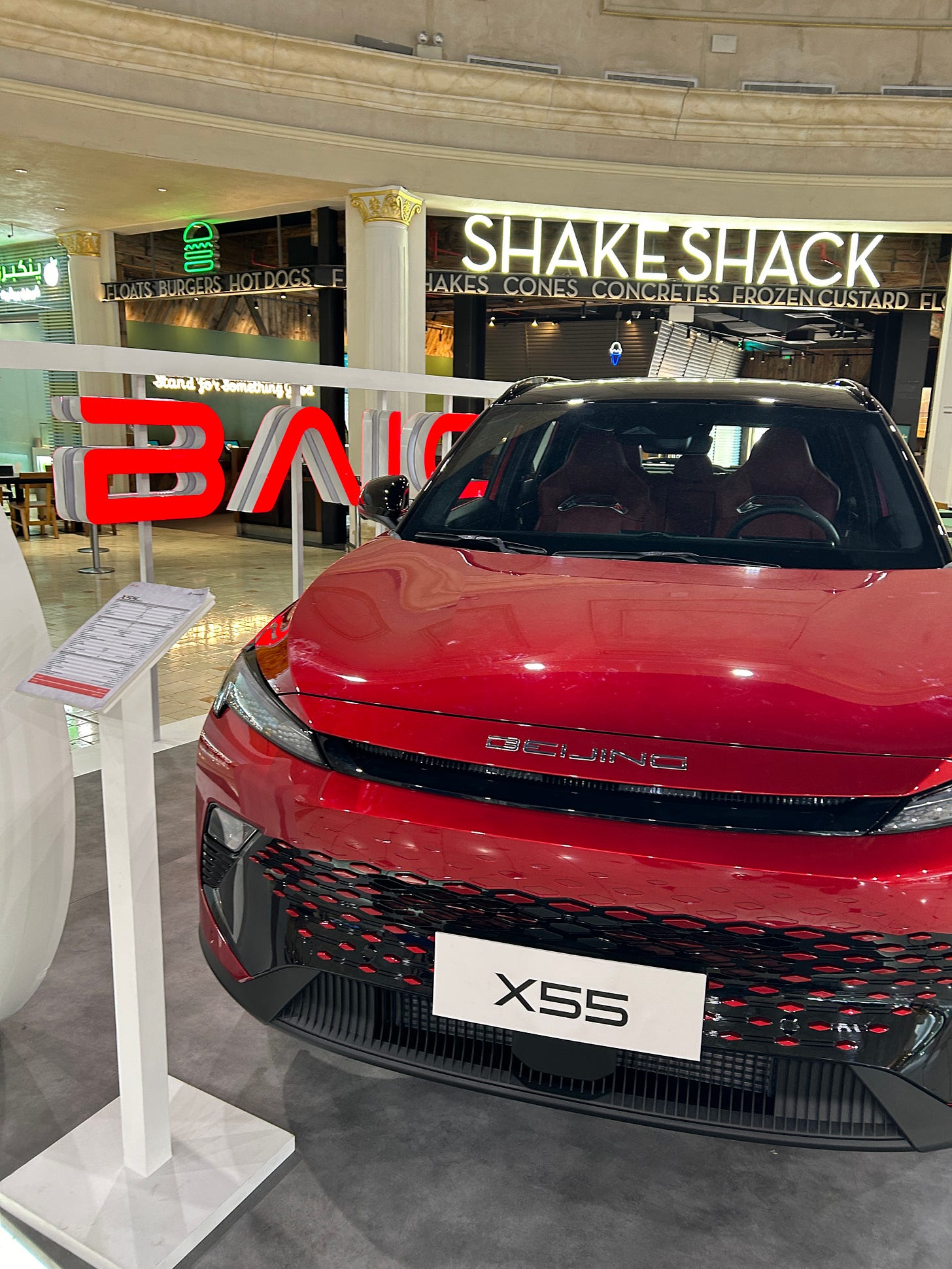
You see lots of ads for Jetours on YouTube and lots of Cherys on the road. (Not as many as Kias or Nissans, but a lot.) Ten years ago, there used to be some Great Wall copies of the Hilux on the road, but those mostly seem to have disappeared, replaced by (apparently) more successful vehicles. I wager that you’d see way more Chinese marques on the road if it weren’t for the fact that Chinese firms are all-in on the EV transition and Qatar is, well, a hydrocarbon state with little interest to date in forcing an EV transition.
This isn’t even getting into the fact that there are local and regional brands, like TeaTime, that compete in product segments—the fast food and karak market, for instance—where there aren’t any Western brands, or the wide array of Indian and other South Asian products that have local restaurants and outlets without any branded competition at all. And the market for, say, biryani is pretty big around here—more, I’d guess, than the revenues for local McDonald’s. Note that the pizza is a Qatari-Italian fusion of an Indian dish—you can have a lot of globalization without America.
I mention this because I want to break any easy assumption you have that globalization means Americanization or that the Americanization of consumerism is a permanent condition or that the United States remains, as Madeleine Albright called it, the “indispensable nation”. The United States is a powerful country, no doubt, but it’s not 1985—there are alternatives to U.S. products and services in sectors from high-tech to consumer to military to energy. (Less so, if I say somewhat self-interestedly, in higher education, but even there alternatives exist.) An Arab Middle East decoupled from the United States would not collapse (if that were ever in the cards!) or yearn for material goods gone by—it would adjust pretty quickly. At this stage of international development, the United States and American firms are just one element of globalization, rather than the aim of international engagement itself.
On a day-to-day basis, relations are fraying, even if I’m not always sure that folks in senior roles in the White House fully appreciate it. When I order from Talabat (a sort of Uber Eats on steroids—a platform for delivery of fast food, good food, groceries, electronics, flowers, and so on), the first thing I see is a suggestion that I donate to relief efforts in Gaza and Lebanon:
This is everyday international relations, and what it implies for the United States is pretty significant. I don’t think it’s an earth-shattering revelation that U.S. ties with Israel are unpopular, but I’m not sure it’s appreciated that there’s not a hint of both-sidesing to any part of this, or that supporting Gaza is so unexceptionable that consumer firms run ads for it right next to their discount coupons.
Even folks who dislike Hezbollah (a larger category than you think!) tend to be rather upset with the current situation. Add in U.S.-backed war with Iran and, well, there’s going to be a lot of folks even more upset about that. A war in which the United States directly participates would be even more of a blow to the U.S. image. Yes, the United States has continued to play a role throughout the region after the 2003 war with Iraq and the anti-ISIS war, but a second major war in the Gulf in a generation might lead to complicated dynamics.
To be sure, and every essay about the region needs a hell of a “to be sure” paragraph, the issues at stake are both simple and complicated. (And if you think they’re only simple, or only complicated, you’re misguided.) But my sense is that people in the United States tend to think that local reactions can be dismissed, and it’s my even stronger sense that people in policymaking positions think that everything is fine but for one or two little issues. ("Other than that, Mrs. Lincoln.”)
The situation is, on at least a medium-term basis, more fluid and (even?) less favorable for the United States than it appears. The United States faces a complicated calculus in terms of how to achieve its interests and balance its constraints, domestic and international. Erring would carry grave consequences—and not for the United States alone, but for all of its allies and partners (and, more important, for ordinary people trapped in rotten situations). Instead of taking for granted what seems to be solid at first glance, U.S. policy—and, one would hope, the American public—should carefully examine the facts on the ground.

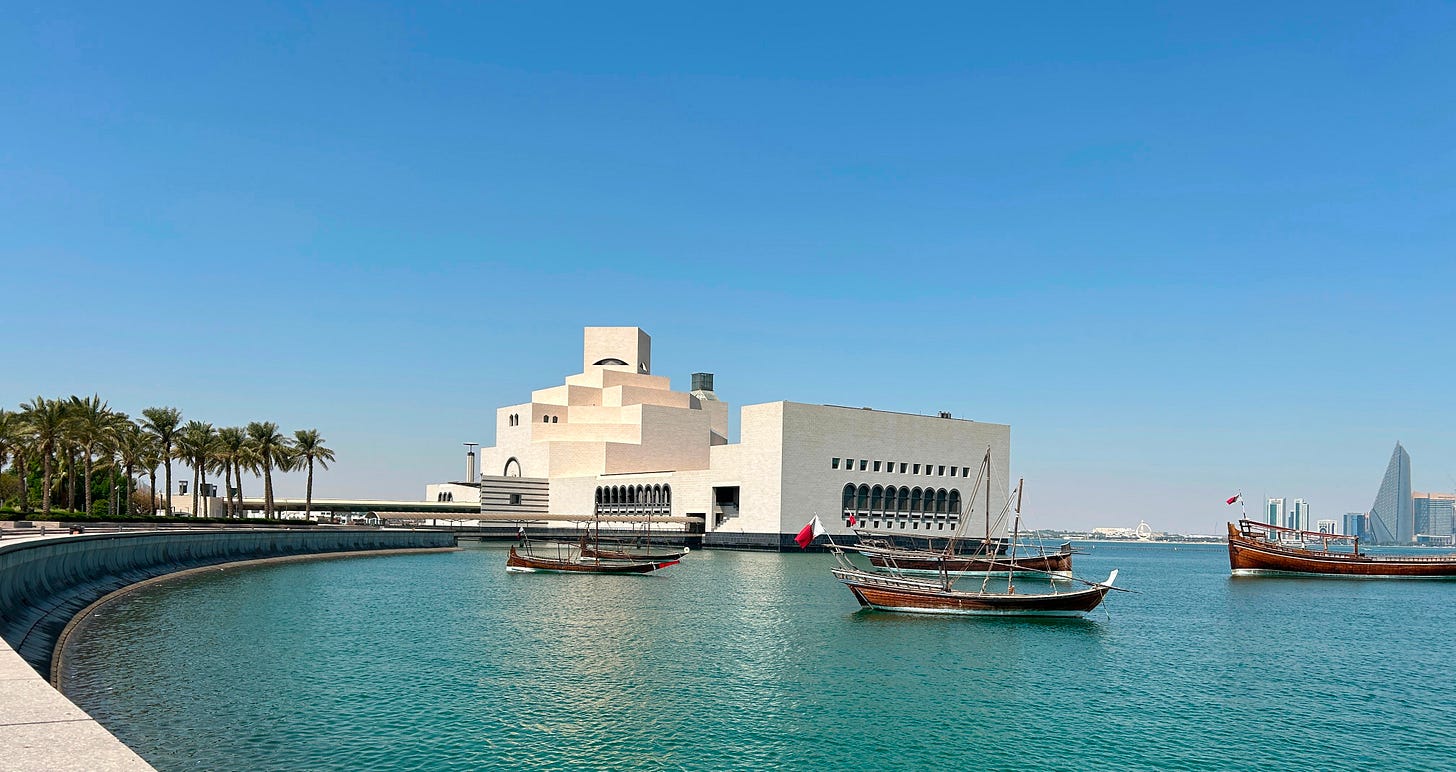
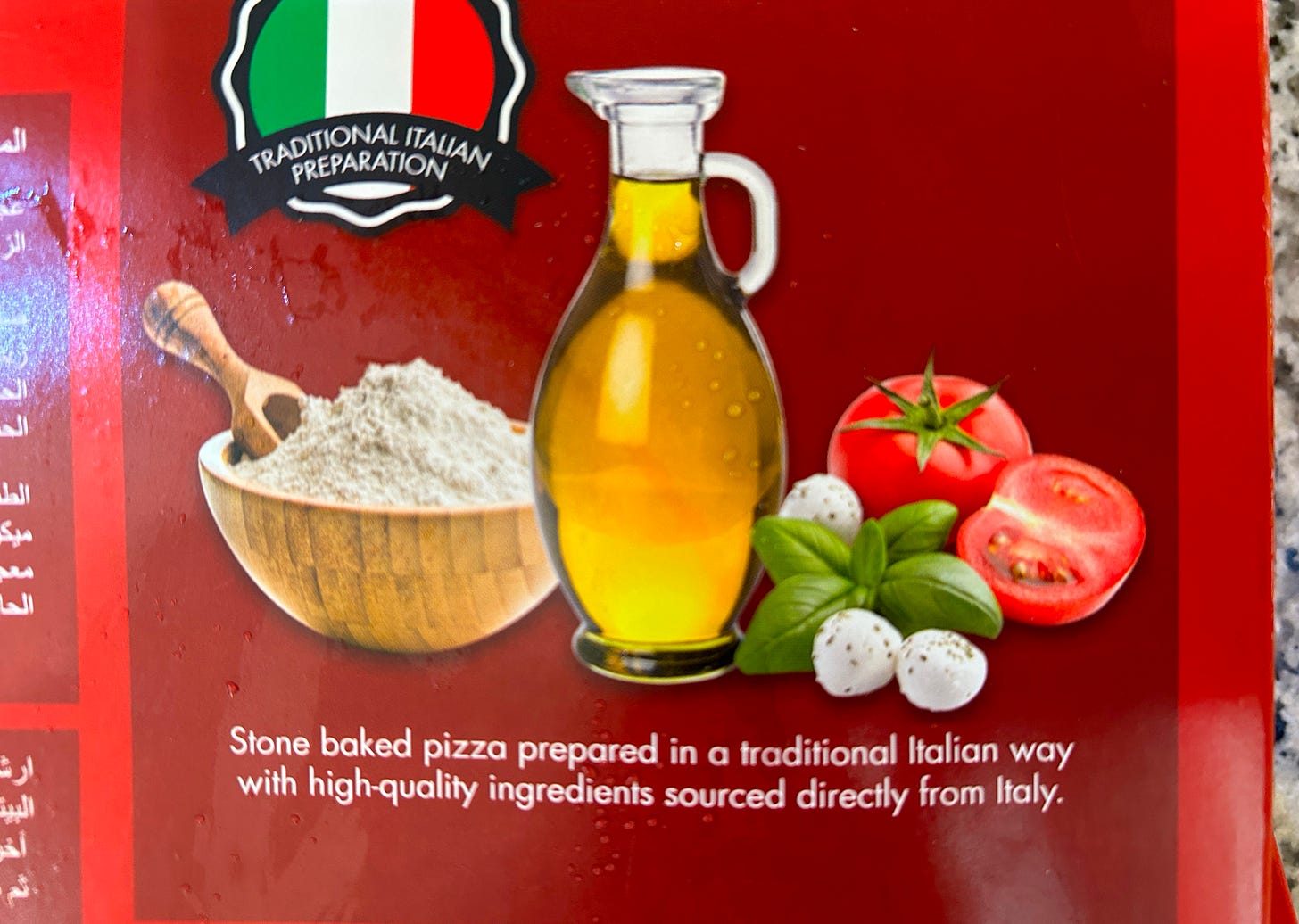
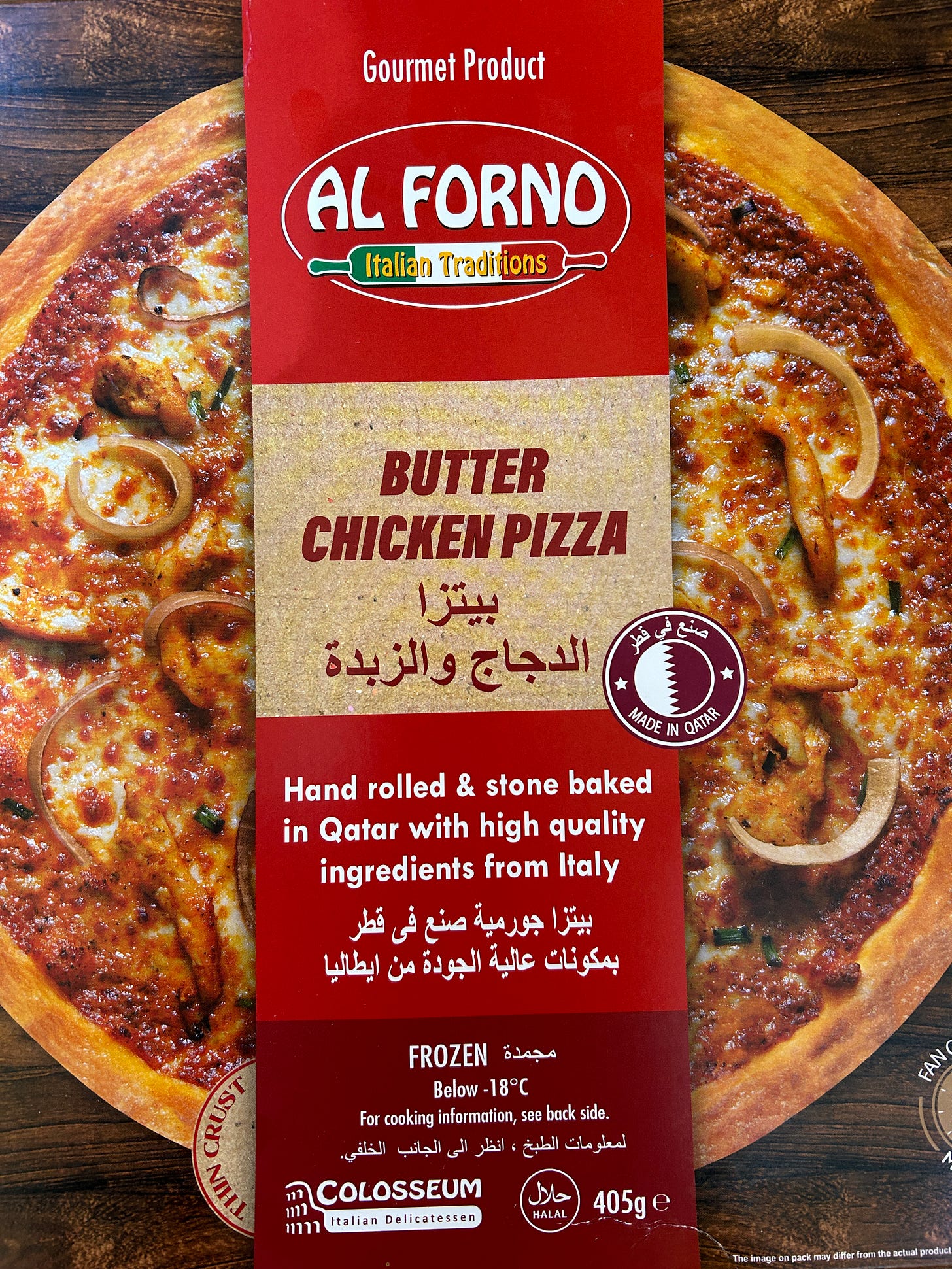
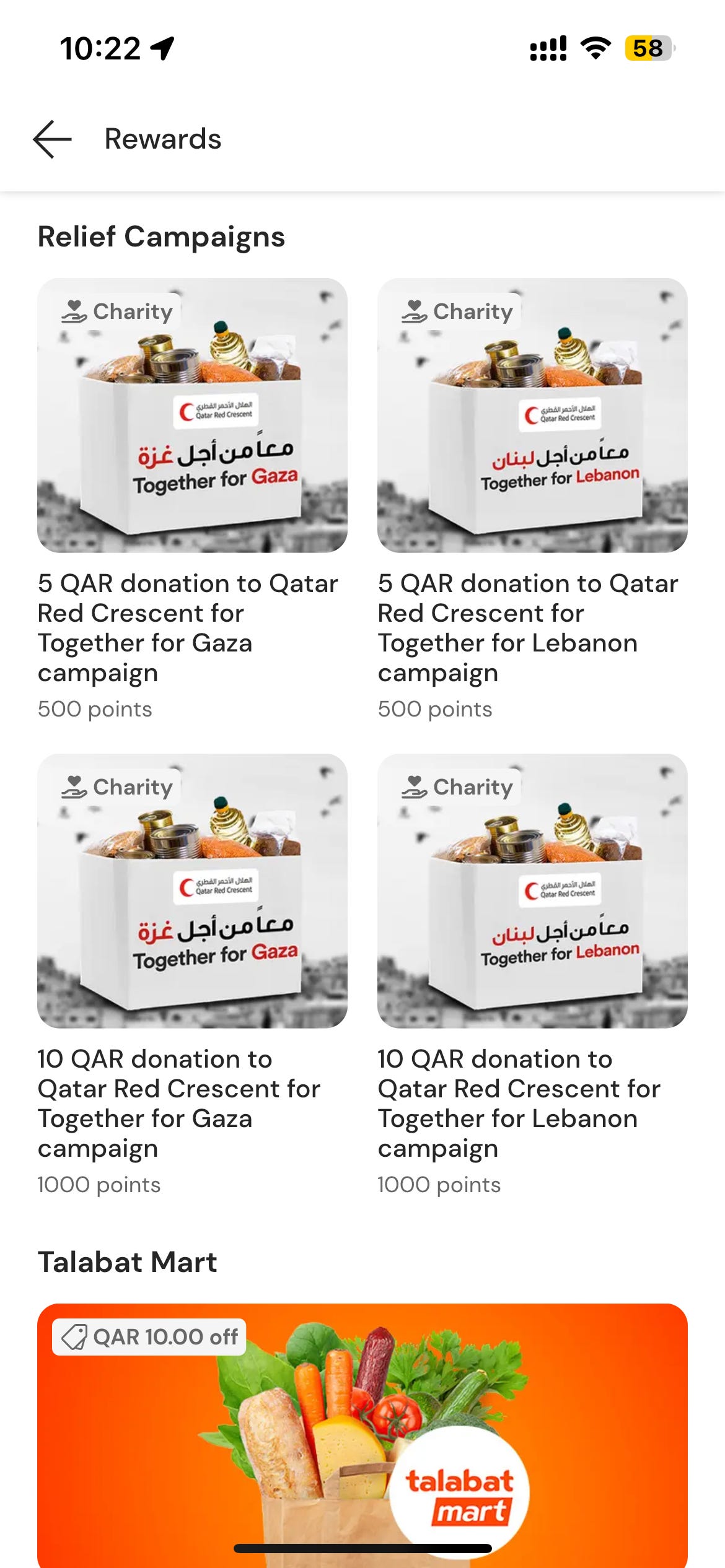
Superb, revelatory piece (for me) from our man newly in Qatar. I learned more from this column about Qatar - from local food options to geopolitical import - than anything I've ever read.
Enjoying your takes on life in Doha. I was there 2021-23 and similarly marveled at the globalization of consumerism. Back home in northeast Indiana now, I certainly miss the variety of international products as well as the ease and efficiency of Talabat.